The defence team of Fr. Mathiang appealed the High Court ruling. However, South Sudan’s Court of Appeal reconfirmed the High Court ruling, and having considered the gravity of the offence, doubled the jail term to 14 years.
In a March 23 report, a member of Fr. Mathiang’s defence team, Advocate Malith Jokthiang Wundit, is quoted as saying that their client “was convicted on the allegation and confession of one of the accused persons and there were no independent witnesses” and that “there was no credible evidence connecting him to the crime,” thus the acquittal.
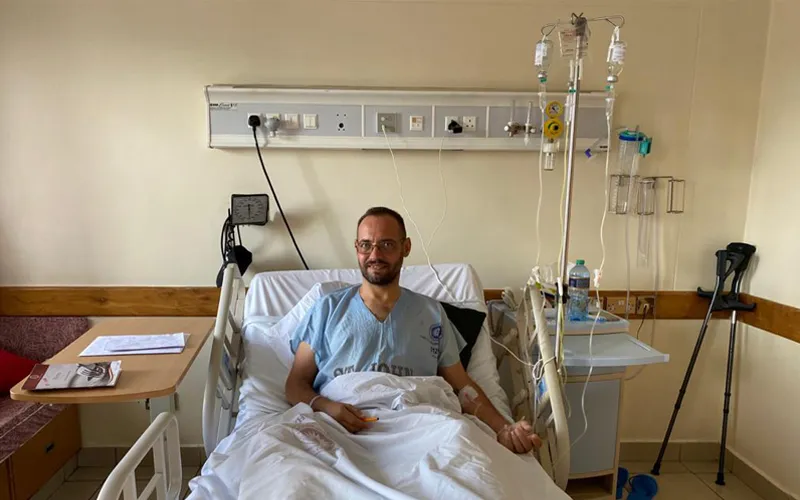 Bishop Christian Carlassare in Kenya’s capital, Nairobi for specialized treatment. Credit: ACI Africa
Bishop Christian Carlassare in Kenya’s capital, Nairobi for specialized treatment. Credit: ACI Africa
Weighing in on Fr. Mathiang’s acquittal, a Catholic leader in South Sudan told ACI Africa, “It came as a total surprise. There was no news that there was a retrial. People wonder how the release came about.”
“Fr. Mathiang was arrested because he was involved in communication with those who shot the Bishop (elect),” the Catholic leader added.
(Story continues below)
The Catholic leader, who did not want to be mentioned for security reasons went on to pose, “What did the Supreme Court do to the evidence that was presented to the High Court and the Court of Appeal?”
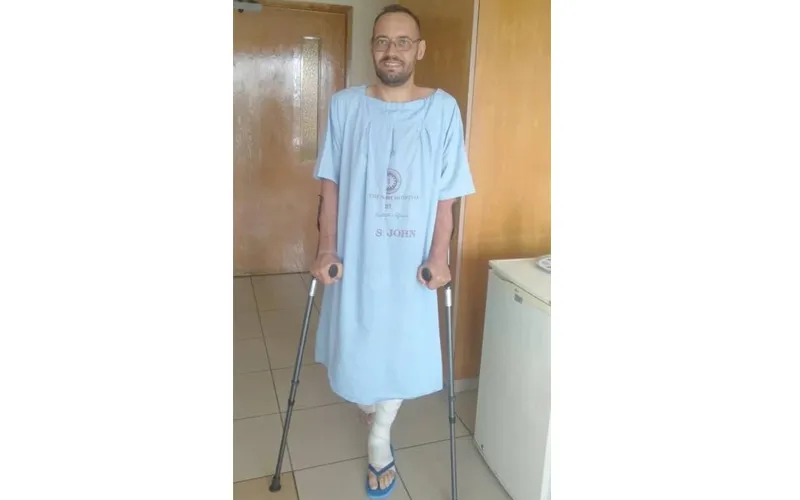 Credit: ACI Africa
Credit: ACI Africa
“In this case that was followed by the State (South Sudan), all evidence pointed to the Father, and one does not need to be a lawyer to see how and why Fr. Mathiang was involved. How could he be acquitted of all the charges?” the Catholic leader further posed, questioned the decision of South Sudan’s Supreme Court.
The Catholic leader continued, “In turning the case upside down and declaring him (Fr. Mathiang) innocent, isn’t this justice aborted? Doesn’t this give grave discredit to the legal system here (South Sudan)? Doesn’t this give weight to the unfortunate assertion that every organ in this country is corrupted?”
“There are some diehard supporters of Fr. Mathiang who want to twist things around and make him a victim. But who is the real victim in this case?” the Catholic leader posed, and continued, “Nothing is mentioned of the real victim who is the bishop shot. The bishop was shot; those who shot the bishop were arrested; they pointed to the man who planned the assault on the Bishop. How can the aggressors now be made to appear to be the victim?”
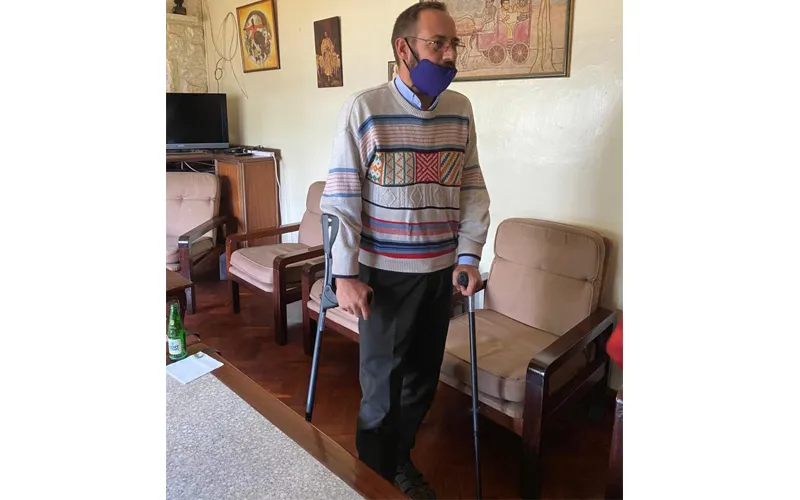 Bishop Christian Carlassare, recuperating at a Comboni community in Nairobi, Kenya after having been discharged from hospital on 17 May 2021. Credit: ACI Africa
Bishop Christian Carlassare, recuperating at a Comboni community in Nairobi, Kenya after having been discharged from hospital on 17 May 2021. Credit: ACI Africa
Fr. Mathiang’s press conference
On March 22, Fr. Mathiang addressed journalists in Juba. Gratitude in the form of “heartfelt appreciation” characterized his address; he thanked his defence team, judges of the Supreme Court, the Director of Juba National Prison and his staff, and members of his family, among others, for facilitating his release from prison and acquittal on all counts.
Fr. Mathiang said he recognized Bishop Carlassare as his Local Ordinary, and sought to emphasize that he had supported his 8 March 2021 Episcopal appointment.
“For sure I'm already going back to the Diocese of Rumbek; I've been here (Juba) and I'm going back to continue with my service,” Fr. Mathiang told journalists in Juba on March 22.
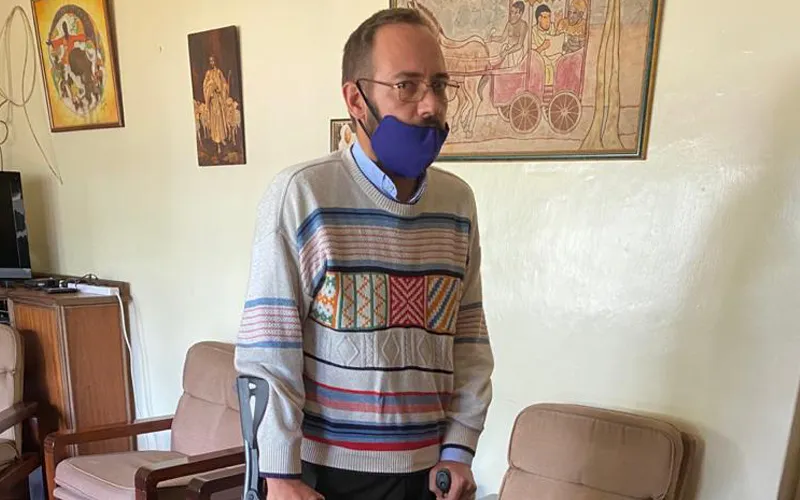 Credit: ACI Africa
Credit: ACI Africa
Reacting to Fr. Mathiang’s press conference, a Catholic Church leader in South Sudan empathized with Bishop Carlassare and described the situation as “complex”.
“The situation is complex for the bishop. Will he receive Fr. Mathiang back? What will be the consequence?” the Catholic leader posed, and added, “Did he (Fr. Mathiang) ever admit his role in the attack on the Bishop (elect)”?
The Catholic Church leader further queried, “What will be the consequence if the Bishop of Rumbek does not accept him back into the Diocese?”
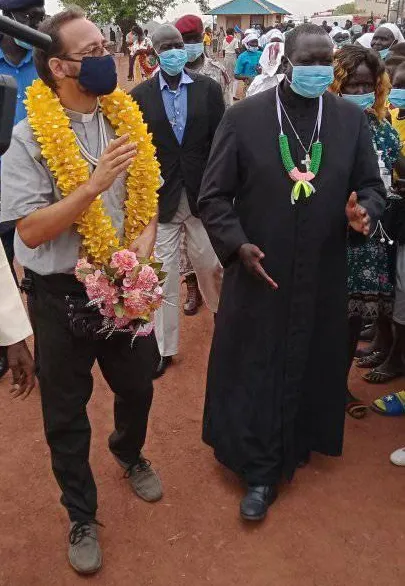 “Aren’t there those who benefited during the former administration and may want to act in a way consistent with their loss?” the Catholic leader further queried, referring to Fr. Mathiang’s eight-year administration, from 27 December 2013, when Fernando Cardinal Filoni, then Prefect of the Congregation for the Evangelization of Peoples, appointed him to serve as Diocesan Coordinator till Bishop Carlassare was appointed.
“Aren’t there those who benefited during the former administration and may want to act in a way consistent with their loss?” the Catholic leader further queried, referring to Fr. Mathiang’s eight-year administration, from 27 December 2013, when Fernando Cardinal Filoni, then Prefect of the Congregation for the Evangelization of Peoples, appointed him to serve as Diocesan Coordinator till Bishop Carlassare was appointed.
The Catholic leader continued, “I can already in anticipation see that the acquittal of Fr. Mathiang will stir up in him (Bishop Carlassare) some unpleasant memories.”
“It is just enough to look at those pictures again and to see the magnitude of the violence directed to him; he could have died and now the issue to be simply dismissed like that? Isn’t this really sad?” the Catholic Church leader in South Sudan further posed.

Canon law
According to a Kenyan specialist in Canon Law, Fr. Mathiang’s acquittal by the Supreme Court does not guarantee him automatic resumption of Priestly Ministry.
“The civil court does not have supremacy over an ecclesiastical tribunal on matters ecclesiastical. Therefore, he (Fr. Mathiang) is supposed to be put through the ecclesiastical process,” he said.
The Church might have delayed to take appropriate action over this matter, the Kenyan Canonist told ACI Africa.

Making reference to the Penal Sanctions in the Church outlined in Canon 1370 and the related penalties mentioned in Canon 1336 §§ 2-4, the Canonist said that soon after being convicted and sentenced by the High Court in South Sudan, Fr. Mathiang “was supposed to have been suspended from exercising his Priestly duties and all privileges that come with it, including residing in the presbytery.”

“Now that suspension could have remained in force if its term is still running,” he further said, and added, the Church will still seek to pursue the truth because she believes in the words of Jesus in John 8:31-32: “If you abide in my word, you are truly my disciples, and you will know the truth, and the truth will set you free.”
ACI Africa was founded in 2019. We provide free, up-to-the-minute news affecting the Catholic Church in Africa, giving particular emphasis to the words of the Holy Father and happenings of the Holy See, to any person with access to the internet. ACI Africa is proud to offer free access to its news items to Catholic dioceses, parishes, and websites, in order to increase awareness of the activities of the universal Church and to foster a sense of Catholic thought and culture in the life of every Catholic.
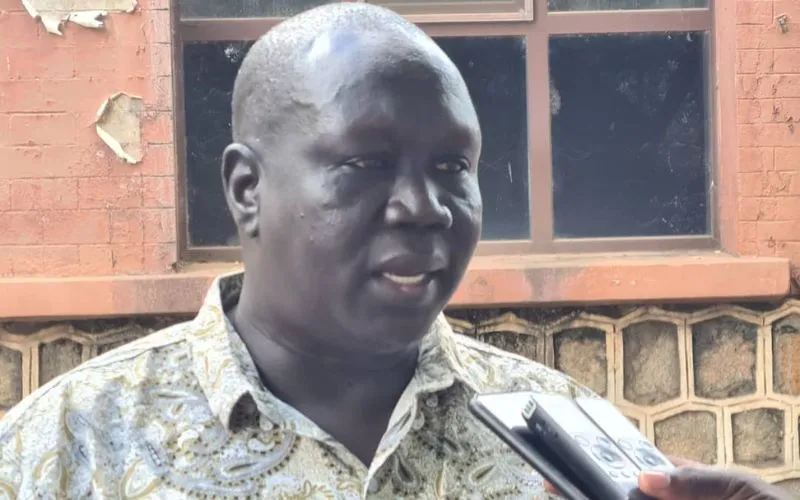 Fr. John Mathiang. Credit: Ginaba Lino/Juba/South Sudan
Fr. John Mathiang. Credit: Ginaba Lino/Juba/South Sudan


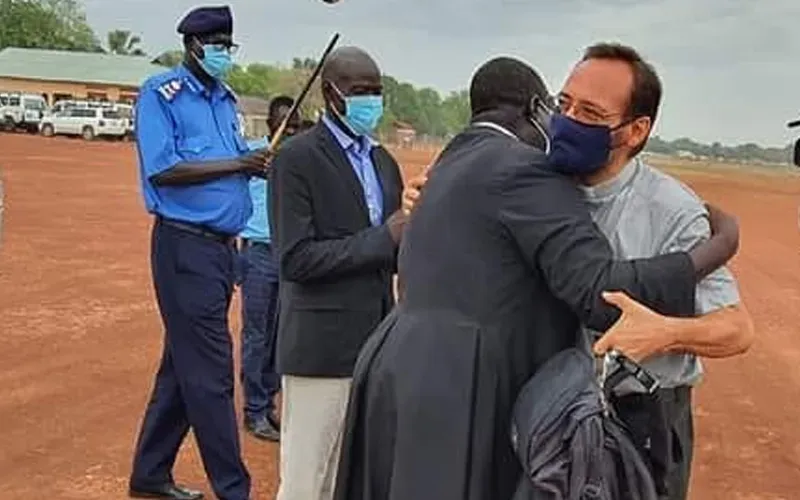
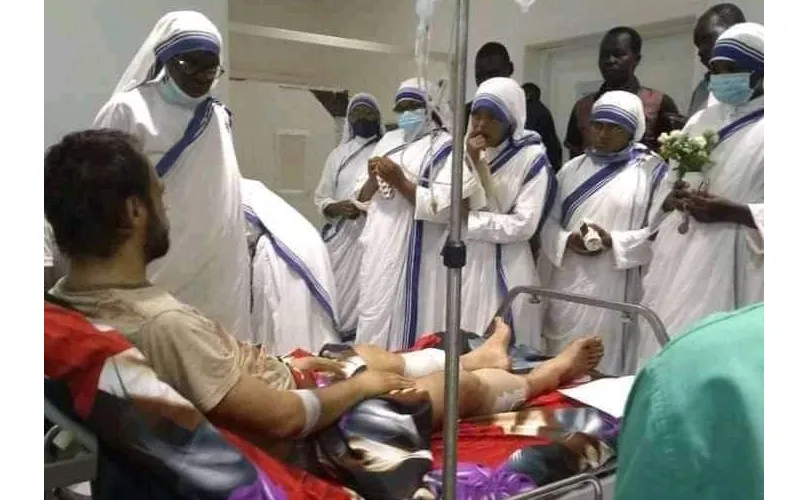 Mother Teresa Sister's in South Sudan visit Bishop Christian Carlassare after the April 26 attack. Credit: Courtesy Photo
Mother Teresa Sister's in South Sudan visit Bishop Christian Carlassare after the April 26 attack. Credit: Courtesy Photo
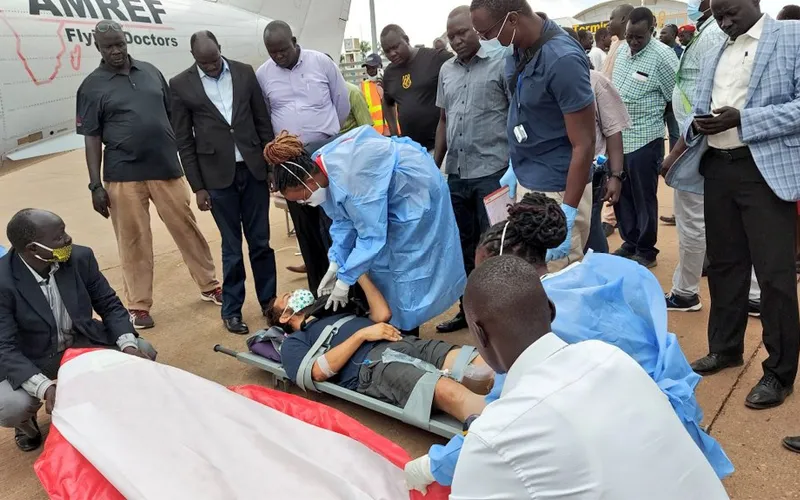 Bishop Christian Carlassare airlifted to Kenya’s capital, Nairobi, through the services of the African Medical and Research Foundation (AMREF) for specialized treatment. Credit: Courtesy Photo
Bishop Christian Carlassare airlifted to Kenya’s capital, Nairobi, through the services of the African Medical and Research Foundation (AMREF) for specialized treatment. Credit: Courtesy Photo Bishop Christian Carlassare in Kenya’s capital, Nairobi for specialized treatment. Credit: ACI Africa
Bishop Christian Carlassare in Kenya’s capital, Nairobi for specialized treatment. Credit: ACI Africa Credit: ACI Africa
Credit: ACI Africa Bishop Christian Carlassare, recuperating at a Comboni community in Nairobi, Kenya after having been discharged from hospital on 17 May 2021. Credit: ACI Africa
Bishop Christian Carlassare, recuperating at a Comboni community in Nairobi, Kenya after having been discharged from hospital on 17 May 2021. Credit: ACI Africa Credit: ACI Africa
Credit: ACI Africa “Aren’t there those who benefited during the former administration and may want to act in a way consistent with their loss?” the Catholic leader further queried, referring to Fr. Mathiang’s eight-year administration, from 27 December 2013, when
“Aren’t there those who benefited during the former administration and may want to act in a way consistent with their loss?” the Catholic leader further queried, referring to Fr. Mathiang’s eight-year administration, from 27 December 2013, when 





